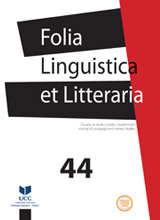NIETZSCHE’S AMOR FATI IN DAVID FOSTER WALLACE’S INFINITE JEST
NIETZSCHE’S AMOR FATI IN DAVID FOSTER WALLACE’S INFINITE JEST
Author(s): Narjess Jafari LangroudiSubject(s): Language and Literature Studies, Studies of Literature, American Literature
Published by: Filološki fakultet, Nikšić
Keywords: Amor fati; Anhedonia; Destiny; Jest; Escape; Metamorphosis
Summary/Abstract: This paper aims to show the blasé characters of Wallace’s Infinite Jest exposed to the postmodern zeitgeist who fear and hate fate for its dominance, as is depicted in his works. The indifference, apathy, skepticism and equivocation which circumscribed Wallace’s characters in Infinite Jest show their escapist analysis of the quirks of fate. This study tries to find out whether Wallace’s characters affirmatively embrace the power of fate or negatively deny it. After a close reading of Wallace’s Infinite Jest, the researcher highlights that Nietzsche’s concept of amor fati is absent for Wallace’s characters because, fallaciously, they were either trying to ignore it or demystify it. Wallace characters’ means of coping with fate metamorphoses them into apathetic beings that are finally in a constant quarrel with themselves. Both their escape from fate and their craving for its demystification culminate in their drowning in life and its pleasures, and then it becomes clear they can no longer enjoy anything and they become afflicted with anhedonia. Wallace’s characters cannot know why their lives are worth living, so they fall into deadly living. It argues that fate entangles human freedom and human extrication from their carnal desires becomes a big delusion in the infinite jest of their lives. The immanent fight with fate will make life’s jest very serious. And when life is taken too seriously, its jest will intensively make a mockery of humans.
Journal: Folia Linguistica et Litteraria
- Issue Year: 2023
- Issue No: 44
- Page Range: 133-148
- Page Count: 16
- Language: English

